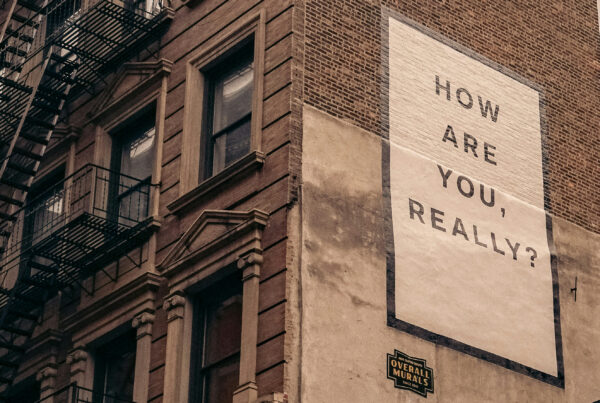I will never forget my first anxiety attack. I had applied to graduate school with naive confidence only to discover right away that I was the youngest, least experienced, and most certainly the dumbest student in the program. One evening I was sitting in a seminar when my body suddenly went into full-on fight-or-flight mode. People’s voices began sounding tinny and far away, and I felt like I was watching the room from the ceiling. My heart began racing so violently I thought it might explode. I could not catch my breath and felt as if I had just run a mile at top speed even though I was sitting perfectly still. It was terrifying.
Perhaps the most alarming aspect of the attack was that there did not seem to be any obvious reason for the physical reaction I was having. The professor had not called on me to speak or singled me out in any way. I had just been silently listening to the class discussion and BAM–adrenaline tsunami. That’s what made it so horrifying. If I could not find the reason for this attack, then how could I prevent another?
Coping with Acute Anxiety
If you have ever experienced acute anxiety, you might have an idea of the spiral that can get started in a moment like this. The dread of another attack caused me to fear the situations where they had occurred – my classes. Of course, that heightened apprehension primed the pump in my nervous system so that the slightest trigger set off the very thing I dreaded: another anxiety attack. Needless to say, the attacks became regular occurrences for a while.
I wish I could tell you that I turned my eyes upon Jesus and my fears and anxiety melted away, but that is not what happened. I was not at all close to the Lord during that season, and I never once felt His presence in the storms of anxiety. Here is the beautiful thing, though: He was there the whole time. In spite of me, God used the precise way He had designed me to bring help. He used my stubbornness and aversion to the spotlight to eventually end the attacks. Because I am stubborn, I refused to quit school.
Obstinately I went to class each day even though I knew I would likely have an anxiety attack. Then, because I abhor drama, I remained silently in place when an attack came. By God’s grace I managed to keep an outward appearance of calm while internally my nervous system was in complete chaos.
Although I attended class regularly, I didn’t learn much academically in those months. What I did learn was that if I just held on, the attack would subside at some point. I’m not sure when the shift happened, but in time when the adrenaline onslaught arrived, I would just take a deep breath and rest in the knowledge that it would eventually be over. Every attack still felt horrifying as it was happening, but gradually I survived enough of them that my dread of them faded. Once the dread was gone, my nervous system was less agitated, and the attacks came less and less often until they were rare occurrences.
How the Brain Heals Itself
When I told this story to a counselor later, she nodded and said, “Your brain healed itself.” At the time I accepted her words and patted myself on the back, but I’ve since learned what she meant. In his book The Anatomy of a Soul, Christian psychiatrist Curt Thompson explains that the human brain was designed with a trait called neuroplasticity – which essentially means that our brains have the ability to re-wire if we are willing to do the necessary work.
When speaking of mental health issues, much attention is given to the ways that our brains can be adversely affected by difficult experiences, inadequate attachment, or trauma. Such attention is absolutely important. However, the discussion must not stop at understanding why we have the unhealthy or unproductive behavior patterns we have. The enemy of our souls would love for us to believe we are victims – either to our circumstances or to our genetics. Therefore, it is equally vital to recognize that just as the brain can be changed in unhealthy ways, it can also be changed in ways that bring wholeness. The apostle Paul urges us in Romans 12 to “be transformed by the renewing of [our] minds.” Turns out, God designed the human brain to be able to do just that!
The Pathway to Wholeness
As Thompson explains, “neurons that fire together wire together.” In the case of my anxiety, there are always two neural pathways that can be paved in my brain. One increases my anxiety, diminishes my life, and impedes my relationship with God and others. The other path reduces anxiety and allows for growth and intimacy with the Lord and His creation.
Here is the key: Pathways are created from repeated, heavy traffic. Although I don’t always get to choose whether or not feelings of anxiety are present in my life, I do get to choose my response. What this means to me is that although anxious feelings still hitch a ride as I journey through difficult or uncertain seasons, I don’t have to let them sit in the driver’s seat.
Even if a neural pathway is deeply ingrained, I can choose to stop traveling down that road. If I pay attention, I can consciously choose another route. The pathway to wholeness may seem difficult to see and arduous at first, but the more I choose it, the more pronounced that path becomes and the more natural it will be to take it in the future. A good counselor can give excellent strategies to help calm a storm of anxiety and choose a better response that will begin wiring healthier neural pathways.
It has been profoundly life-giving for me to learn about how the human brain was designed by God. The more I learn, the more I am awed at the goodness of our Creator. My trust in Him increases exponentially when I consider this: He knew that we would fail, He knew that sin would mar creation, and He knew that sinners would harm one another. In His kindness, He planned in advance for Christ to redeem us from our sin.
Just as staggering to me is the fact that He also fashioned our minds to be able to find wholeness again even after harm. When we turn to Christ for salvation and trust His design for wholeness, we become tools for crafting His kingdom on earth. We are more than conquerors because He wired us that way.
How will God rewrite your story this Easter? Join us online or at a local campus in Central Florida to celebrate Easter at Grace.





